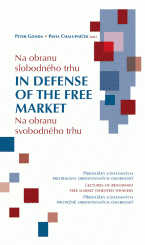 |
|||||||
| INSTITUTE | CONSERVATISM | M.R.STEFANIK |
| NEWS
|
[18.08.2008, Ľuba Lesná, NEWS]
The president’s spokesman, Marek Trubač, made the statement in response to a letter from Amnesty International Slovakia (AI) that urged Gašparovič to address the topic. Branislav Tichý, head of AI’s Slovak office, stressed in a press release that world leaders attending the Olympic Games should use the opportunity to speak out against China's imprisonment of dissidents and other prisoners of conscience. “Not doing so can be interpreted as agreeing that governments can host Olympic Games in an atmosphere of oppression and persecution,” Tichý said. Trubač said the president’s itinerary in China doesn’t include any official meetings or talks because he was invited by the International Olympic Committee. The president wants to be there to support Slovak athletes who represent the country abroad and contribute to its reputation, he explained. Moreover, Trubač said, the Olympics transcend politics. “Even though (the president) is a politician, he is going to the Games as a representative of Slovakia, which should be presented respectfully and in a dignified way,” he told the private Markíza channel on August 4. But AI sees it differently. “To stand for human rights is not a political gesture, but rather an advancement of humanity,” Tichý said. AI noted a report published on July 28 alleging that Chinese authorities have broken their promise to improve the country’s human rights and betrayed the core values of the Olympics. Roseann Rife, Asia-Pacific Deputy Director at AI, said that Chinese authorities have lost sight of the promises they made when they were awarded the Games seven years ago. “The Chinese authorities are tarnishing the legacy of the Games. They must release all imprisoned peaceful activists,” she said on July 28. AI also cites the Olympic Charter which states that the goal of the Olympics is to “put sport in the service of the harmonious development of humanity with a view to promoting a peaceful society concerned with the preservation of human dignity.” The Falun Gong spiritual movement has also urged Gašparovič to speak out while in Beijing. Trubač has dismissed both organisations’ efforts as being for the benefit of their members. But other Slovak non-governmental organisations involved in human rights, such as the Conservative Institute of M. R. Štefánik (KI), People in Peril (Človek v ohrození), and the Society of Friends of Tibet, have sided with AI. Ondrej Dostál, head of KI, pointed out that China’s human rights violations are widely known. “[Trubač’s] statements belittle the situation and show a grave disrespect for the victims of the communist regime in China,” Dostál said. According to the SITA newswire, U.S. President George Bush, Japanese Prime Minister Jasuo Fukuda, French President Nicolas Sarkozy, and Russian Prime Minister Vladimir Putin wer due to attend the opening ceremonies. German President Horst Köhler and Chancellor Angela Merkel, British Prime Minister Gordon Brown and Canadian Prime Minister Stephen Harper were to miss it, though Brown will attend the closing ceremony. Czech Prime Minister Mirek Topolánek is going to Beijing, but will wear a tag bearing the Tibetan flag. Article was published in the Slovakia`s English-language weekly The Slovak Spectator. |
 English | Slovak
English | Slovak
This website was created also thanks to funding granted by The Trust
for Civil Society in Central and Eastern Europe.
Website powered by Metafox CMS from Platon Group.
|
Conservative Institute of M. R. Stefanik |
Tel.:
+421 258 100 188 |

 President Ivan Gašparovič has decided not to bring up human rights with Chinese officials during his visit to the Summer Olympics in Beijing.
President Ivan Gašparovič has decided not to bring up human rights with Chinese officials during his visit to the Summer Olympics in Beijing.





